Biomedical Engineer Resume Examples

Jul 18, 2024
|
12 min read
Fine-tune your future: how to write a biomedical engineer resume that stands out in the healthcare industry.
Rated by 348 people
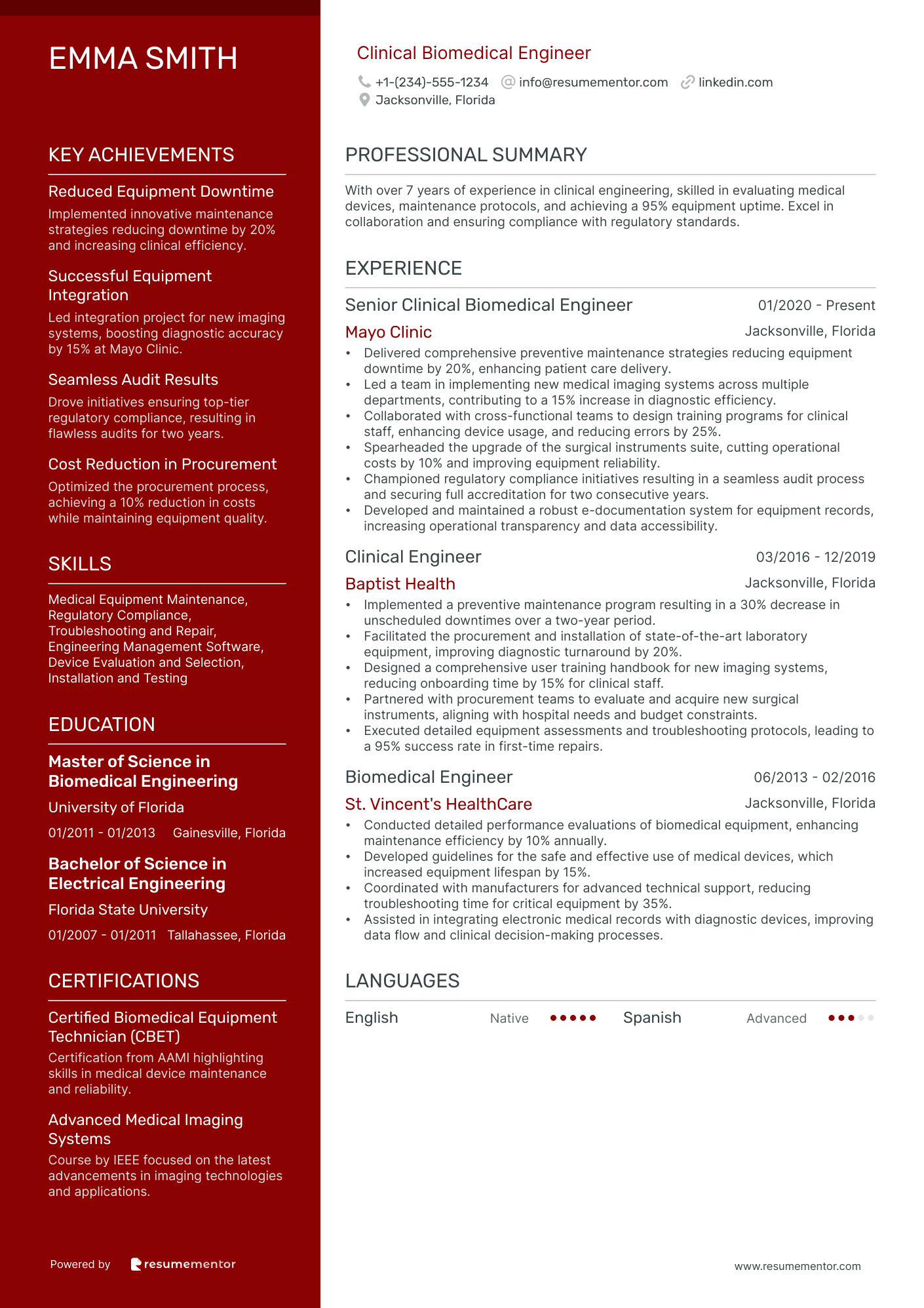
Clinical Biomedical Engineer
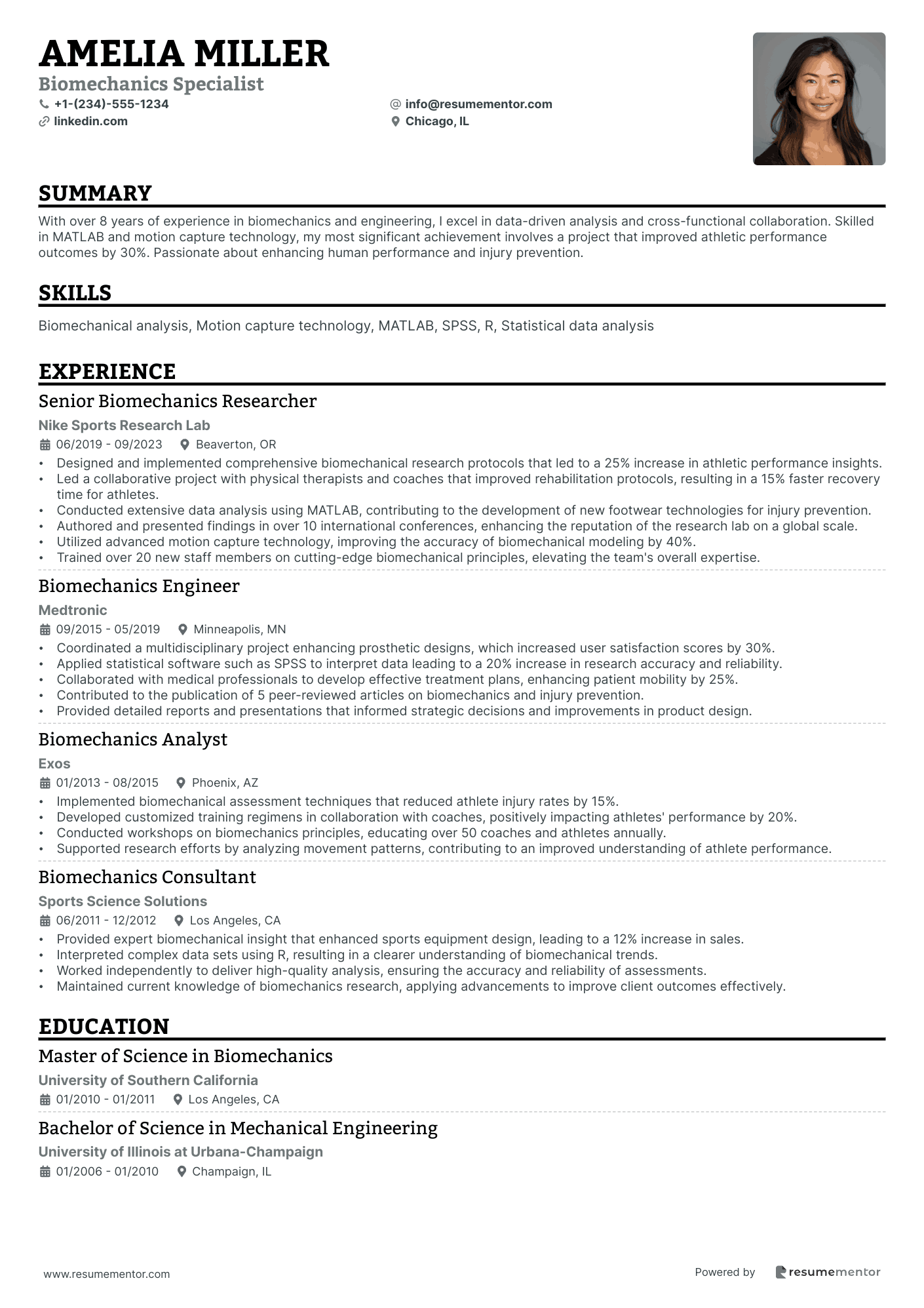
Biomechanics Specialist
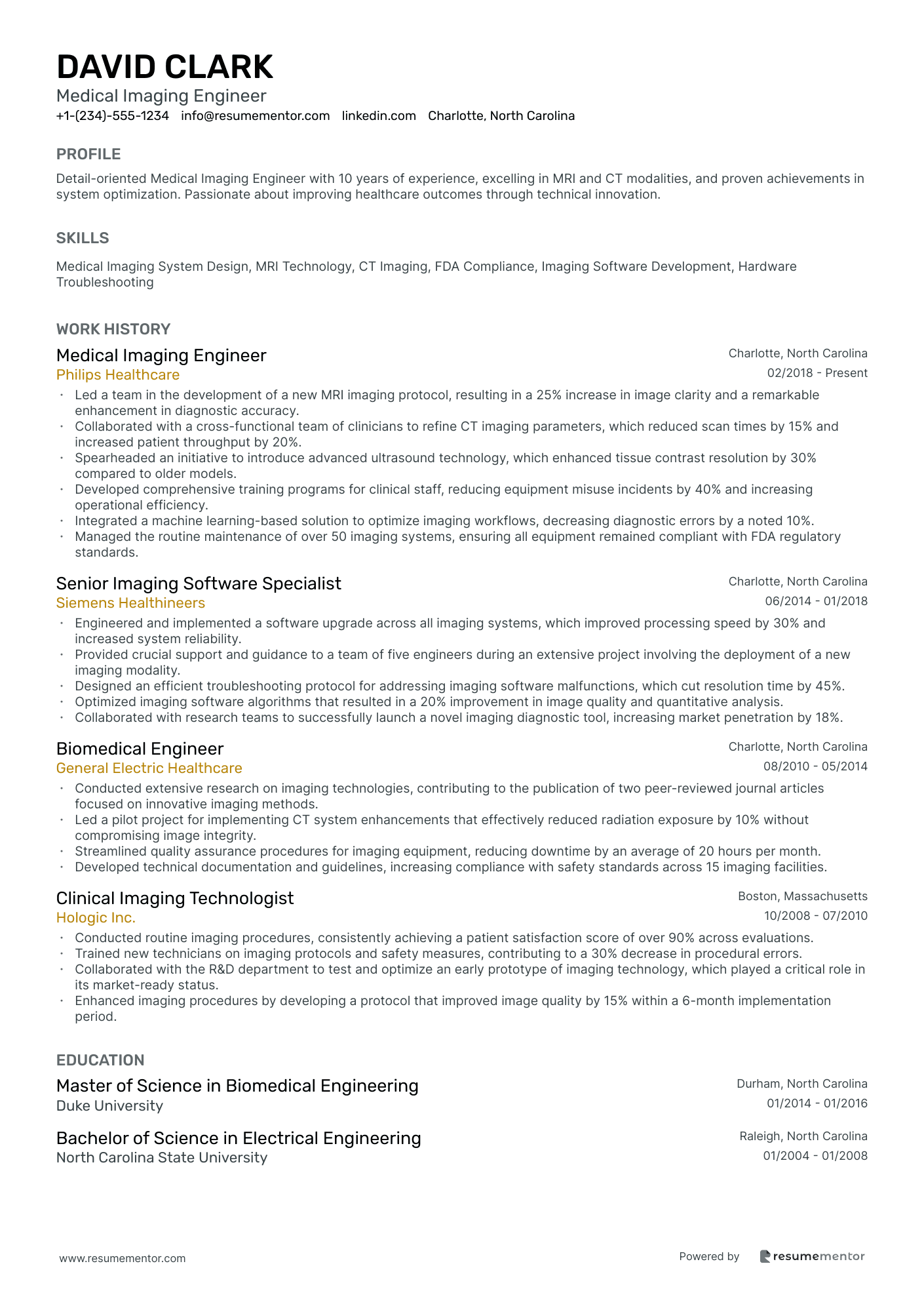
Medical Imaging Engineer
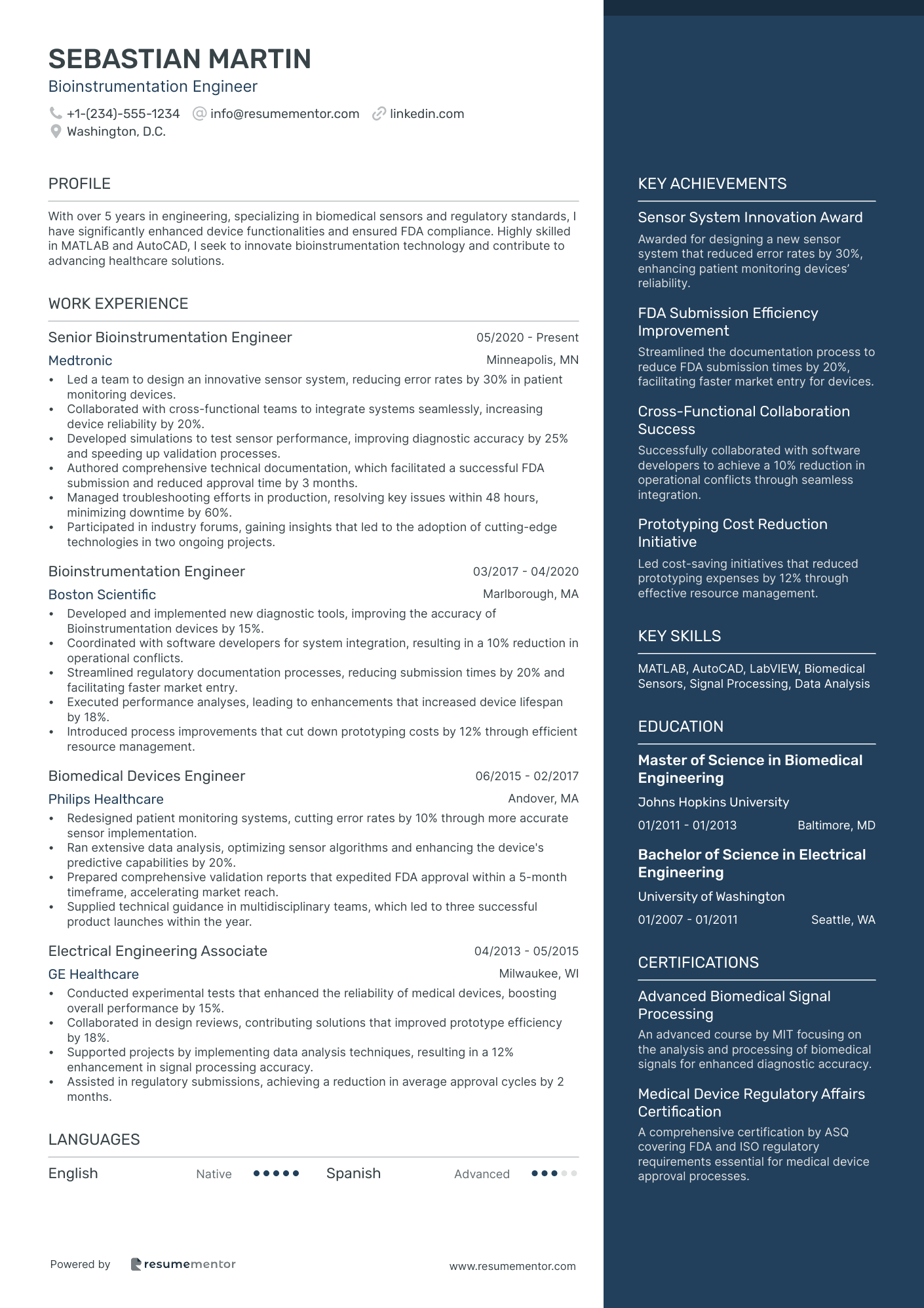
Bioinstrumentation Engineer
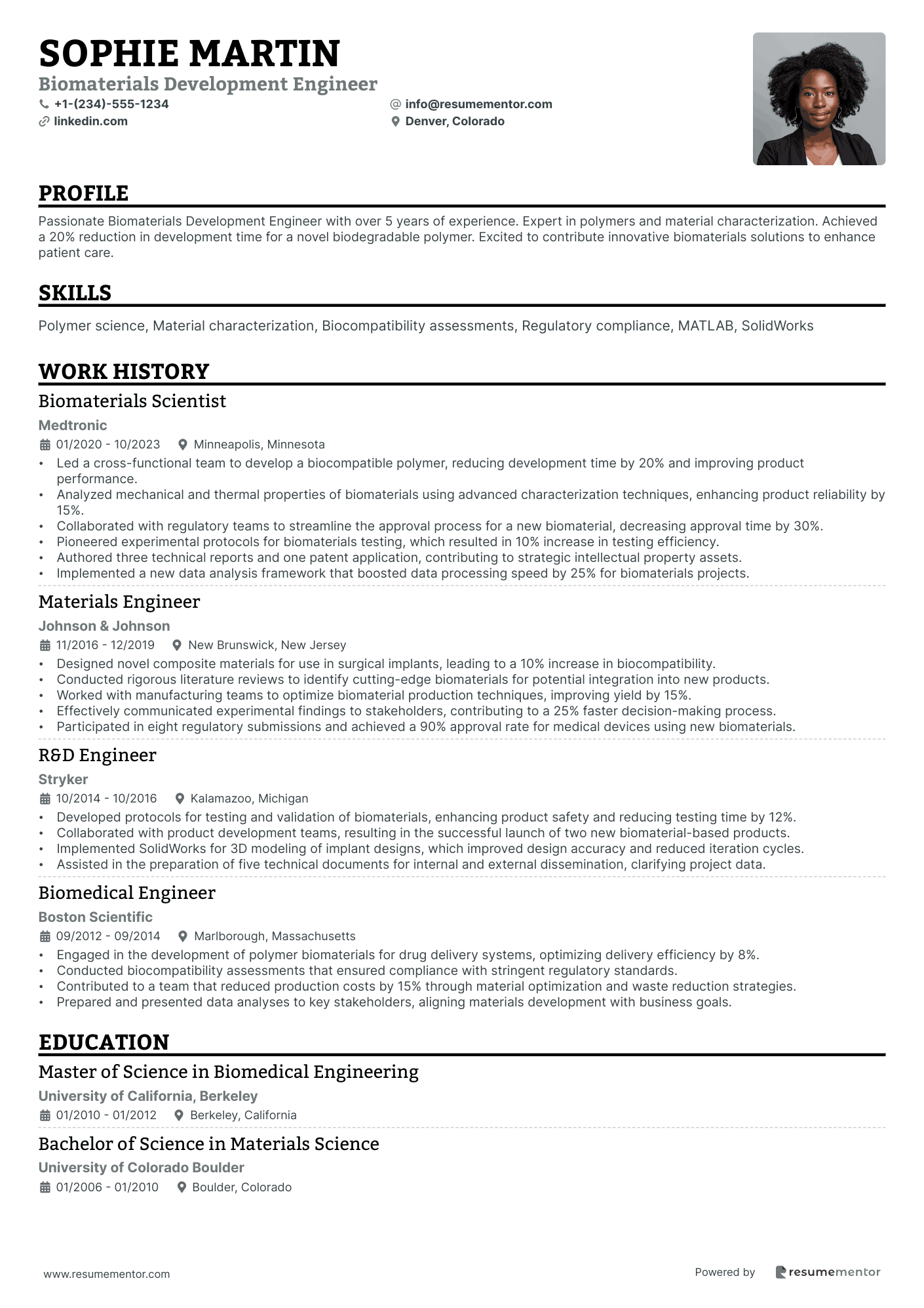
Biomaterials Development Engineer
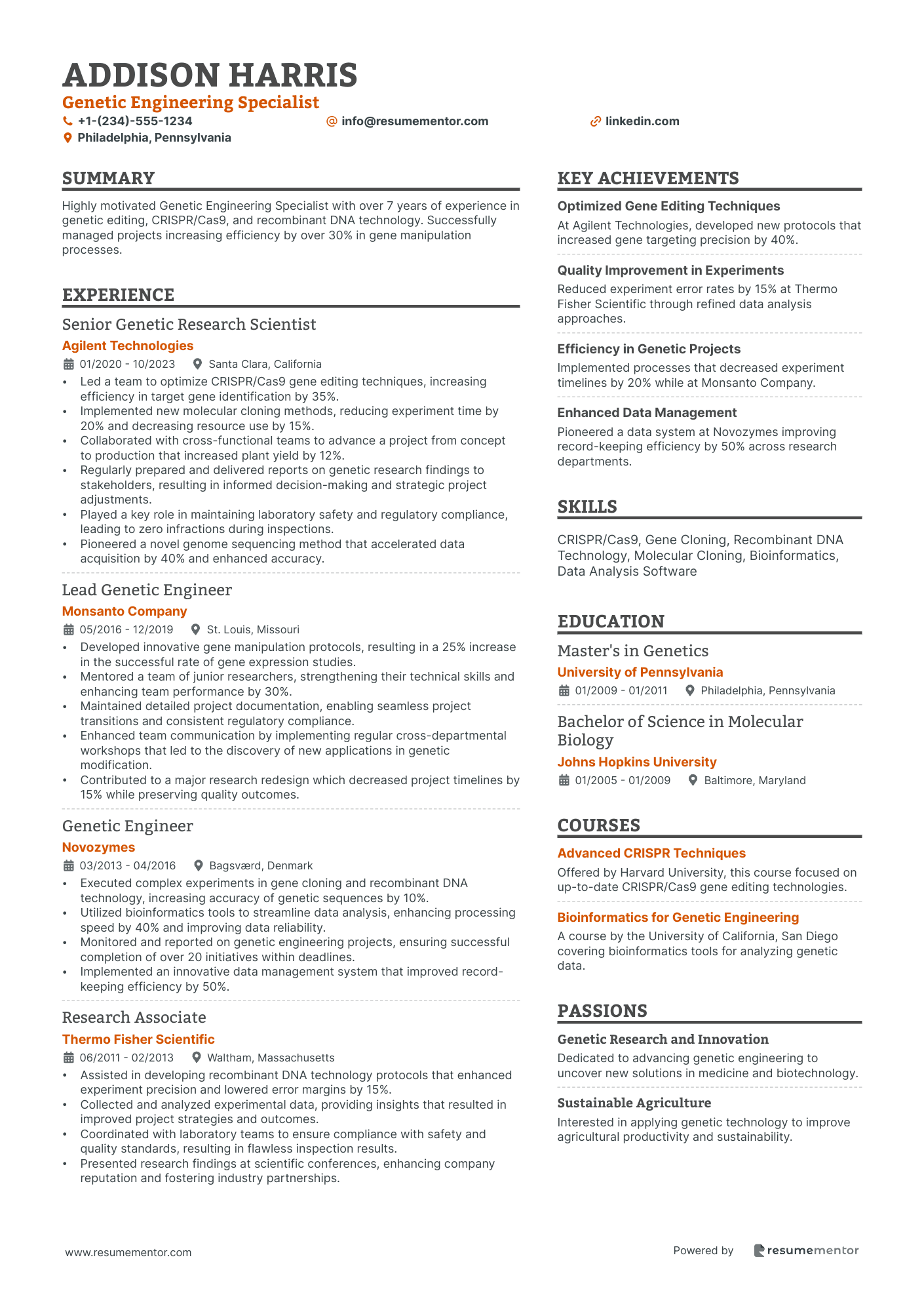
Genetic Engineering Specialist
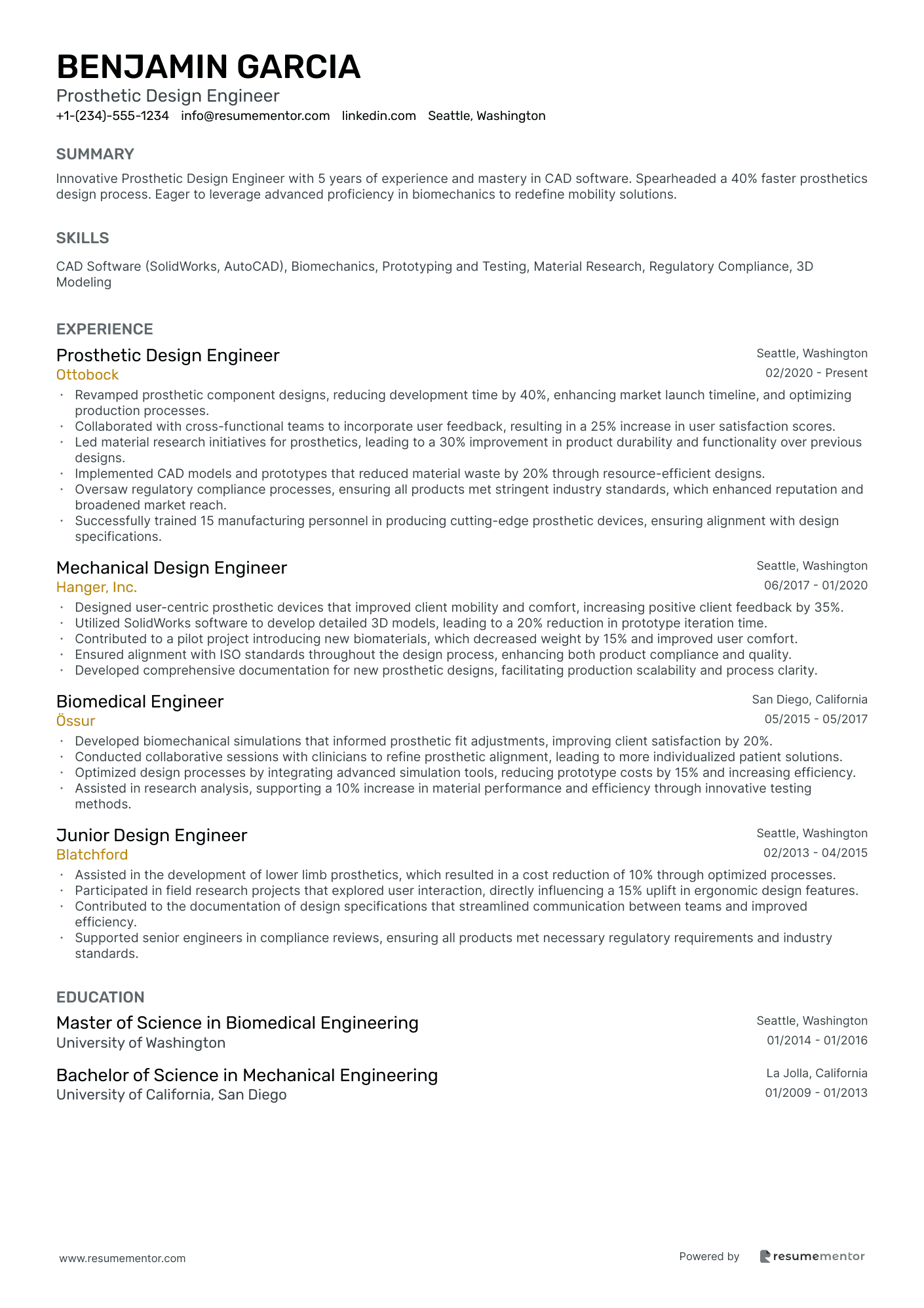
Prosthetic Design Engineer
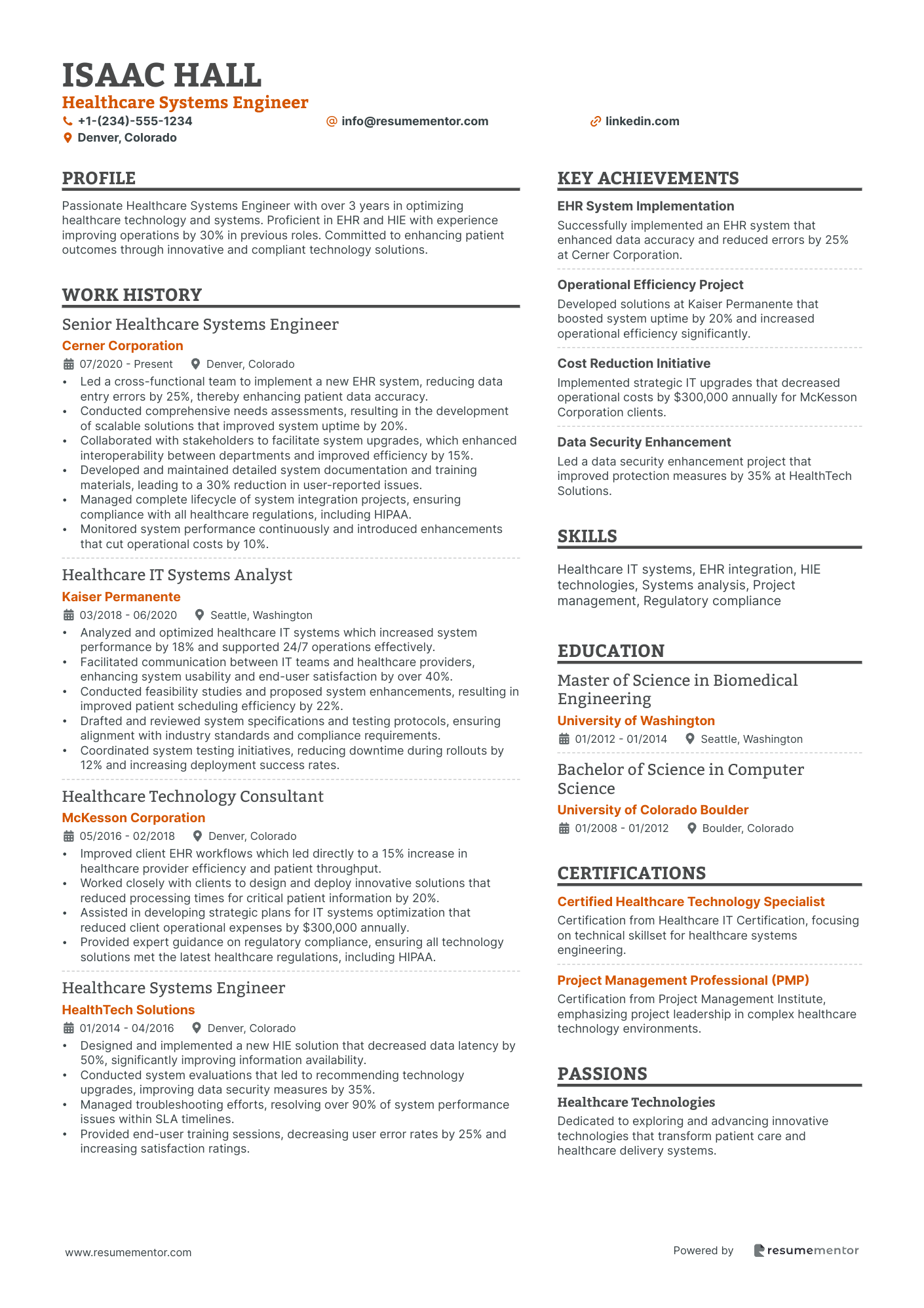
Healthcare Systems Engineer
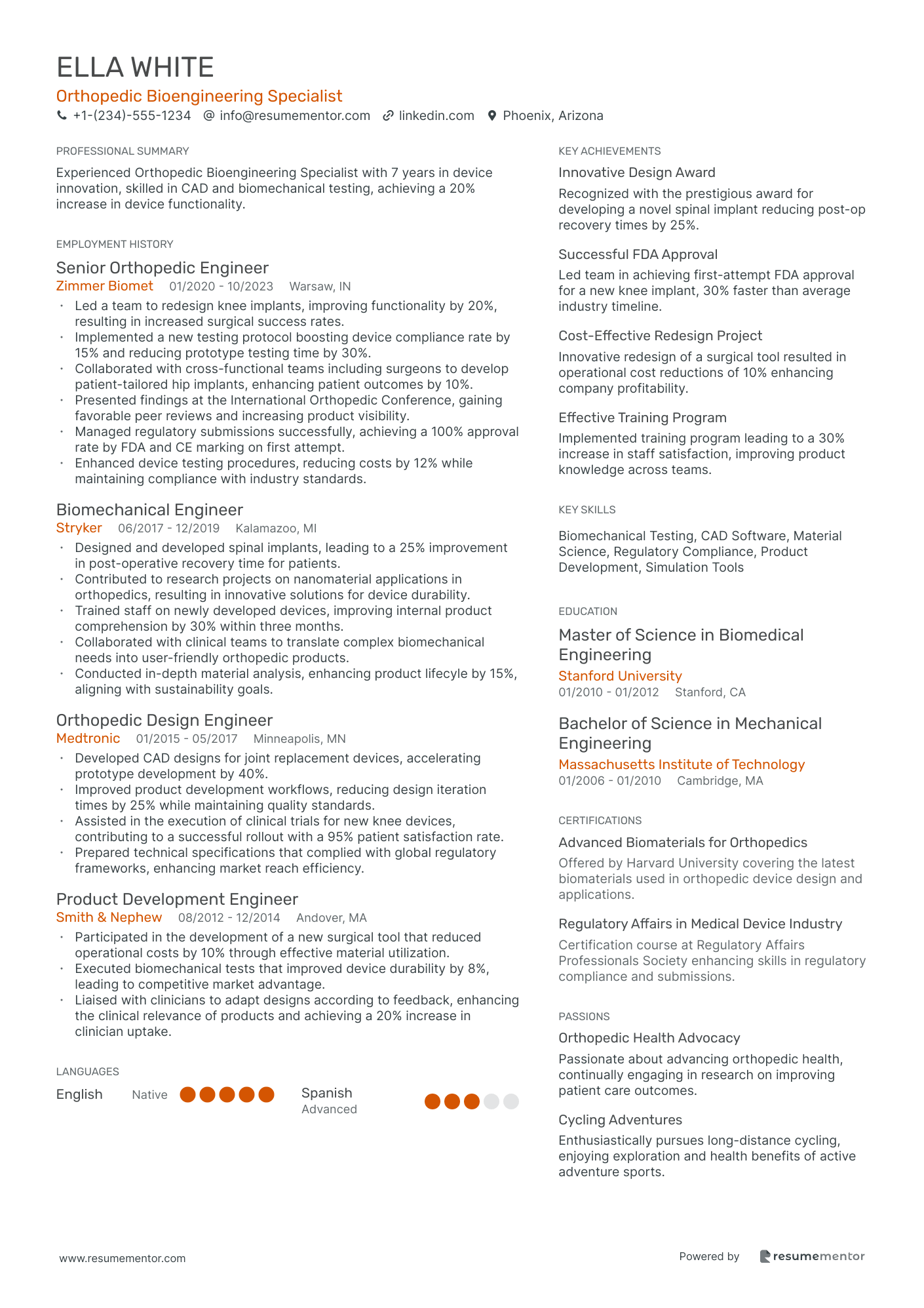
Orthopedic Bioengineering Specialist
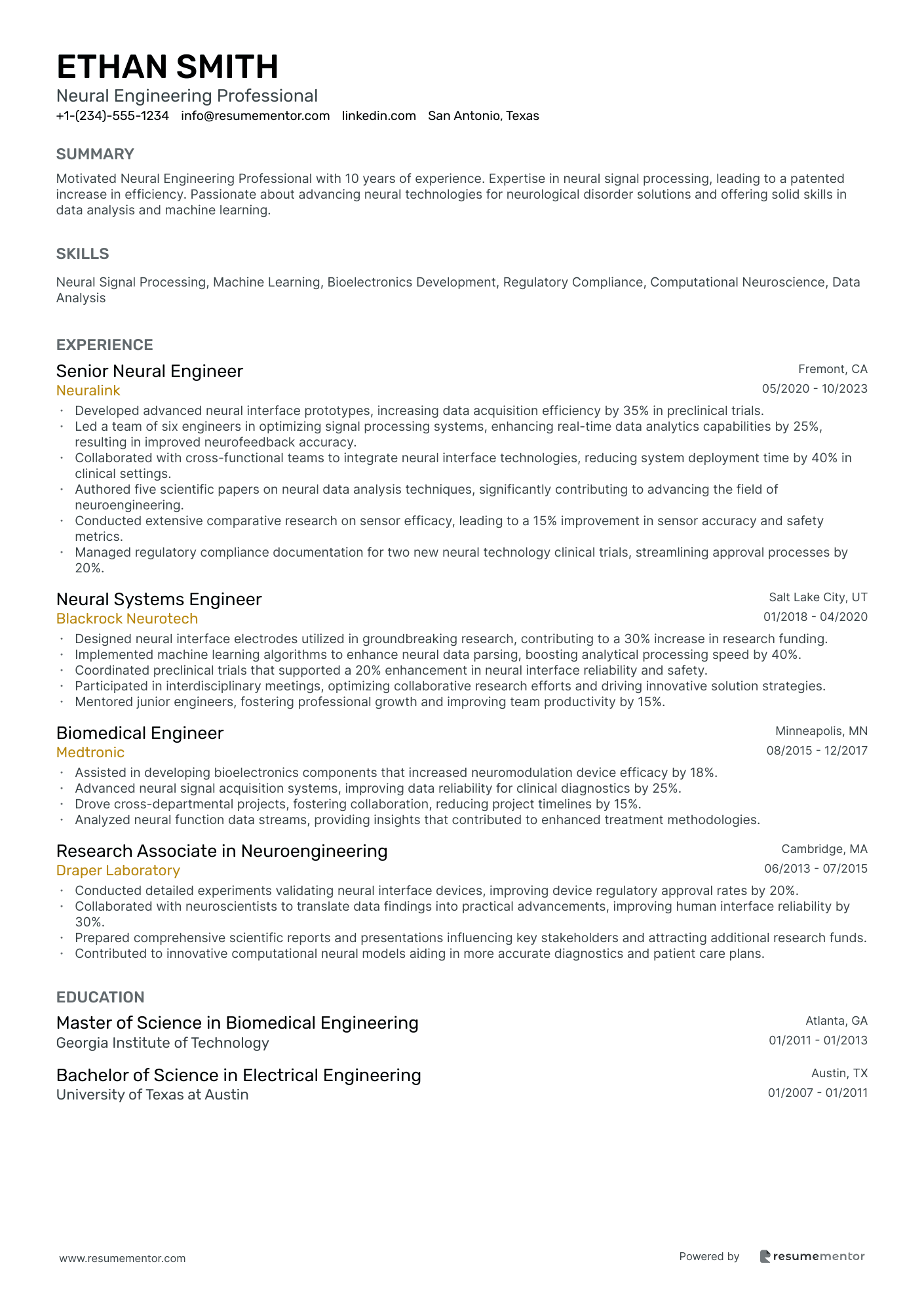
Neural Engineering Professional

Clinical Biomedical Engineer resume sample
- •Delivered comprehensive preventive maintenance strategies reducing equipment downtime by 20%, enhancing patient care delivery.
- •Led a team in implementing new medical imaging systems across multiple departments, contributing to a 15% increase in diagnostic efficiency.
- •Collaborated with cross-functional teams to design training programs for clinical staff, enhancing device usage, and reducing errors by 25%.
- •Spearheaded the upgrade of the surgical instruments suite, cutting operational costs by 10% and improving equipment reliability.
- •Championed regulatory compliance initiatives resulting in a seamless audit process and securing full accreditation for two consecutive years.
- •Developed and maintained a robust e-documentation system for equipment records, increasing operational transparency and data accessibility.
- •Implemented a preventive maintenance program resulting in a 30% decrease in unscheduled downtimes over a two-year period.
- •Facilitated the procurement and installation of state-of-the-art laboratory equipment, improving diagnostic turnaround by 20%.
- •Designed a comprehensive user training handbook for new imaging systems, reducing onboarding time by 15% for clinical staff.
- •Partnered with procurement teams to evaluate and acquire new surgical instruments, aligning with hospital needs and budget constraints.
- •Executed detailed equipment assessments and troubleshooting protocols, leading to a 95% success rate in first-time repairs.
- •Conducted detailed performance evaluations of biomedical equipment, enhancing maintenance efficiency by 10% annually.
- •Developed guidelines for the safe and effective use of medical devices, which increased equipment lifespan by 15%.
- •Coordinated with manufacturers for advanced technical support, reducing troubleshooting time for critical equipment by 35%.
- •Assisted in integrating electronic medical records with diagnostic devices, improving data flow and clinical decision-making processes.
Biomechanics Specialist resume sample
- •Designed and implemented comprehensive biomechanical research protocols that led to a 25% increase in athletic performance insights.
- •Led a collaborative project with physical therapists and coaches that improved rehabilitation protocols, resulting in a 15% faster recovery time for athletes.
- •Conducted extensive data analysis using MATLAB, contributing to the development of new footwear technologies for injury prevention.
- •Authored and presented findings in over 10 international conferences, enhancing the reputation of the research lab on a global scale.
- •Utilized advanced motion capture technology, improving the accuracy of biomechanical modeling by 40%.
- •Trained over 20 new staff members on cutting-edge biomechanical principles, elevating the team's overall expertise.
- •Coordinated a multidisciplinary project enhancing prosthetic designs, which increased user satisfaction scores by 30%.
- •Applied statistical software such as SPSS to interpret data leading to a 20% increase in research accuracy and reliability.
- •Collaborated with medical professionals to develop effective treatment plans, enhancing patient mobility by 25%.
- •Contributed to the publication of 5 peer-reviewed articles on biomechanics and injury prevention.
- •Provided detailed reports and presentations that informed strategic decisions and improvements in product design.
- •Implemented biomechanical assessment techniques that reduced athlete injury rates by 15%.
- •Developed customized training regimens in collaboration with coaches, positively impacting athletes' performance by 20%.
- •Conducted workshops on biomechanics principles, educating over 50 coaches and athletes annually.
- •Supported research efforts by analyzing movement patterns, contributing to an improved understanding of athlete performance.
- •Provided expert biomechanical insight that enhanced sports equipment design, leading to a 12% increase in sales.
- •Interpreted complex data sets using R, resulting in a clearer understanding of biomechanical trends.
- •Worked independently to deliver high-quality analysis, ensuring the accuracy and reliability of assessments.
- •Maintained current knowledge of biomechanics research, applying advancements to improve client outcomes effectively.
Medical Imaging Engineer resume sample
- •Led a team in the development of a new MRI imaging protocol, resulting in a 25% increase in image clarity and a remarkable enhancement in diagnostic accuracy.
- •Collaborated with a cross-functional team of clinicians to refine CT imaging parameters, which reduced scan times by 15% and increased patient throughput by 20%.
- •Spearheaded an initiative to introduce advanced ultrasound technology, which enhanced tissue contrast resolution by 30% compared to older models.
- •Developed comprehensive training programs for clinical staff, reducing equipment misuse incidents by 40% and increasing operational efficiency.
- •Integrated a machine learning-based solution to optimize imaging workflows, decreasing diagnostic errors by a noted 10%.
- •Managed the routine maintenance of over 50 imaging systems, ensuring all equipment remained compliant with FDA regulatory standards.
- •Engineered and implemented a software upgrade across all imaging systems, which improved processing speed by 30% and increased system reliability.
- •Provided crucial support and guidance to a team of five engineers during an extensive project involving the deployment of a new imaging modality.
- •Designed an efficient troubleshooting protocol for addressing imaging software malfunctions, which cut resolution time by 45%.
- •Optimized imaging software algorithms that resulted in a 20% improvement in image quality and quantitative analysis.
- •Collaborated with research teams to successfully launch a novel imaging diagnostic tool, increasing market penetration by 18%.
- •Conducted extensive research on imaging technologies, contributing to the publication of two peer-reviewed journal articles focused on innovative imaging methods.
- •Led a pilot project for implementing CT system enhancements that effectively reduced radiation exposure by 10% without compromising image integrity.
- •Streamlined quality assurance procedures for imaging equipment, reducing downtime by an average of 20 hours per month.
- •Developed technical documentation and guidelines, increasing compliance with safety standards across 15 imaging facilities.
- •Conducted routine imaging procedures, consistently achieving a patient satisfaction score of over 90% across evaluations.
- •Trained new technicians on imaging protocols and safety measures, contributing to a 30% decrease in procedural errors.
- •Collaborated with the R&D department to test and optimize an early prototype of imaging technology, which played a critical role in its market-ready status.
- •Enhanced imaging procedures by developing a protocol that improved image quality by 15% within a 6-month implementation period.
Bioinstrumentation Engineer resume sample
- •Led a team to design an innovative sensor system, reducing error rates by 30% in patient monitoring devices.
- •Collaborated with cross-functional teams to integrate systems seamlessly, increasing device reliability by 20%.
- •Developed simulations to test sensor performance, improving diagnostic accuracy by 25% and speeding up validation processes.
- •Authored comprehensive technical documentation, which facilitated a successful FDA submission and reduced approval time by 3 months.
- •Managed troubleshooting efforts in production, resolving key issues within 48 hours, minimizing downtime by 60%.
- •Participated in industry forums, gaining insights that led to the adoption of cutting-edge technologies in two ongoing projects.
- •Developed and implemented new diagnostic tools, improving the accuracy of Bioinstrumentation devices by 15%.
- •Coordinated with software developers for system integration, resulting in a 10% reduction in operational conflicts.
- •Streamlined regulatory documentation processes, reducing submission times by 20% and facilitating faster market entry.
- •Executed performance analyses, leading to enhancements that increased device lifespan by 18%.
- •Introduced process improvements that cut down prototyping costs by 12% through efficient resource management.
- •Redesigned patient monitoring systems, cutting error rates by 10% through more accurate sensor implementation.
- •Ran extensive data analysis, optimizing sensor algorithms and enhancing the device's predictive capabilities by 20%.
- •Prepared comprehensive validation reports that expedited FDA approval within a 5-month timeframe, accelerating market reach.
- •Supplied technical guidance in multidisciplinary teams, which led to three successful product launches within the year.
- •Conducted experimental tests that enhanced the reliability of medical devices, boosting overall performance by 15%.
- •Collaborated in design reviews, contributing solutions that improved prototype efficiency by 18%.
- •Supported projects by implementing data analysis techniques, resulting in a 12% enhancement in signal processing accuracy.
- •Assisted in regulatory submissions, achieving a reduction in average approval cycles by 2 months.
Biomaterials Development Engineer resume sample
- •Led a cross-functional team to develop a biocompatible polymer, reducing development time by 20% and improving product performance.
- •Analyzed mechanical and thermal properties of biomaterials using advanced characterization techniques, enhancing product reliability by 15%.
- •Collaborated with regulatory teams to streamline the approval process for a new biomaterial, decreasing approval time by 30%.
- •Pioneered experimental protocols for biomaterials testing, which resulted in 10% increase in testing efficiency.
- •Authored three technical reports and one patent application, contributing to strategic intellectual property assets.
- •Implemented a new data analysis framework that boosted data processing speed by 25% for biomaterials projects.
- •Designed novel composite materials for use in surgical implants, leading to a 10% increase in biocompatibility.
- •Conducted rigorous literature reviews to identify cutting-edge biomaterials for potential integration into new products.
- •Worked with manufacturing teams to optimize biomaterial production techniques, improving yield by 15%.
- •Effectively communicated experimental findings to stakeholders, contributing to a 25% faster decision-making process.
- •Participated in eight regulatory submissions and achieved a 90% approval rate for medical devices using new biomaterials.
- •Developed protocols for testing and validation of biomaterials, enhancing product safety and reducing testing time by 12%.
- •Collaborated with product development teams, resulting in the successful launch of two new biomaterial-based products.
- •Implemented SolidWorks for 3D modeling of implant designs, which improved design accuracy and reduced iteration cycles.
- •Assisted in the preparation of five technical documents for internal and external dissemination, clarifying project data.
- •Engaged in the development of polymer biomaterials for drug delivery systems, optimizing delivery efficiency by 8%.
- •Conducted biocompatibility assessments that ensured compliance with stringent regulatory standards.
- •Contributed to a team that reduced production costs by 15% through material optimization and waste reduction strategies.
- •Prepared and presented data analyses to key stakeholders, aligning materials development with business goals.
Genetic Engineering Specialist resume sample
- •Led a team to optimize CRISPR/Cas9 gene editing techniques, increasing efficiency in target gene identification by 35%.
- •Implemented new molecular cloning methods, reducing experiment time by 20% and decreasing resource use by 15%.
- •Collaborated with cross-functional teams to advance a project from concept to production that increased plant yield by 12%.
- •Regularly prepared and delivered reports on genetic research findings to stakeholders, resulting in informed decision-making and strategic project adjustments.
- •Played a key role in maintaining laboratory safety and regulatory compliance, leading to zero infractions during inspections.
- •Pioneered a novel genome sequencing method that accelerated data acquisition by 40% and enhanced accuracy.
- •Developed innovative gene manipulation protocols, resulting in a 25% increase in the successful rate of gene expression studies.
- •Mentored a team of junior researchers, strengthening their technical skills and enhancing team performance by 30%.
- •Maintained detailed project documentation, enabling seamless project transitions and consistent regulatory compliance.
- •Enhanced team communication by implementing regular cross-departmental workshops that led to the discovery of new applications in genetic modification.
- •Contributed to a major research redesign which decreased project timelines by 15% while preserving quality outcomes.
- •Executed complex experiments in gene cloning and recombinant DNA technology, increasing accuracy of genetic sequences by 10%.
- •Utilized bioinformatics tools to streamline data analysis, enhancing processing speed by 40% and improving data reliability.
- •Monitored and reported on genetic engineering projects, ensuring successful completion of over 20 initiatives within deadlines.
- •Implemented an innovative data management system that improved record-keeping efficiency by 50%.
- •Assisted in developing recombinant DNA technology protocols that enhanced experiment precision and lowered error margins by 15%.
- •Collected and analyzed experimental data, providing insights that resulted in improved project strategies and outcomes.
- •Coordinated with laboratory teams to ensure compliance with safety and quality standards, resulting in flawless inspection results.
- •Presented research findings at scientific conferences, enhancing company reputation and fostering industry partnerships.
Prosthetic Design Engineer resume sample
- •Revamped prosthetic component designs, reducing development time by 40%, enhancing market launch timeline, and optimizing production processes.
- •Collaborated with cross-functional teams to incorporate user feedback, resulting in a 25% increase in user satisfaction scores.
- •Led material research initiatives for prosthetics, leading to a 30% improvement in product durability and functionality over previous designs.
- •Implemented CAD models and prototypes that reduced material waste by 20% through resource-efficient designs.
- •Oversaw regulatory compliance processes, ensuring all products met stringent industry standards, which enhanced reputation and broadened market reach.
- •Successfully trained 15 manufacturing personnel in producing cutting-edge prosthetic devices, ensuring alignment with design specifications.
- •Designed user-centric prosthetic devices that improved client mobility and comfort, increasing positive client feedback by 35%.
- •Utilized SolidWorks software to develop detailed 3D models, leading to a 20% reduction in prototype iteration time.
- •Contributed to a pilot project introducing new biomaterials, which decreased weight by 15% and improved user comfort.
- •Ensured alignment with ISO standards throughout the design process, enhancing both product compliance and quality.
- •Developed comprehensive documentation for new prosthetic designs, facilitating production scalability and process clarity.
- •Developed biomechanical simulations that informed prosthetic fit adjustments, improving client satisfaction by 20%.
- •Conducted collaborative sessions with clinicians to refine prosthetic alignment, leading to more individualized patient solutions.
- •Optimized design processes by integrating advanced simulation tools, reducing prototype costs by 15% and increasing efficiency.
- •Assisted in research analysis, supporting a 10% increase in material performance and efficiency through innovative testing methods.
- •Assisted in the development of lower limb prosthetics, which resulted in a cost reduction of 10% through optimized processes.
- •Participated in field research projects that explored user interaction, directly influencing a 15% uplift in ergonomic design features.
- •Contributed to the documentation of design specifications that streamlined communication between teams and improved efficiency.
- •Supported senior engineers in compliance reviews, ensuring all products met necessary regulatory requirements and industry standards.
Healthcare Systems Engineer resume sample
- •Led a cross-functional team to implement a new EHR system, reducing data entry errors by 25%, thereby enhancing patient data accuracy.
- •Conducted comprehensive needs assessments, resulting in the development of scalable solutions that improved system uptime by 20%.
- •Collaborated with stakeholders to facilitate system upgrades, which enhanced interoperability between departments and improved efficiency by 15%.
- •Developed and maintained detailed system documentation and training materials, leading to a 30% reduction in user-reported issues.
- •Managed complete lifecycle of system integration projects, ensuring compliance with all healthcare regulations, including HIPAA.
- •Monitored system performance continuously and introduced enhancements that cut operational costs by 10%.
- •Analyzed and optimized healthcare IT systems which increased system performance by 18% and supported 24/7 operations effectively.
- •Facilitated communication between IT teams and healthcare providers, enhancing system usability and end-user satisfaction by over 40%.
- •Conducted feasibility studies and proposed system enhancements, resulting in improved patient scheduling efficiency by 22%.
- •Drafted and reviewed system specifications and testing protocols, ensuring alignment with industry standards and compliance requirements.
- •Coordinated system testing initiatives, reducing downtime during rollouts by 12% and increasing deployment success rates.
- •Improved client EHR workflows which led directly to a 15% increase in healthcare provider efficiency and patient throughput.
- •Worked closely with clients to design and deploy innovative solutions that reduced processing times for critical patient information by 20%.
- •Assisted in developing strategic plans for IT systems optimization that reduced client operational expenses by $300,000 annually.
- •Provided expert guidance on regulatory compliance, ensuring all technology solutions met the latest healthcare regulations, including HIPAA.
- •Designed and implemented a new HIE solution that decreased data latency by 50%, significantly improving information availability.
- •Conducted system evaluations that led to recommending technology upgrades, improving data security measures by 35%.
- •Managed troubleshooting efforts, resolving over 90% of system performance issues within SLA timelines.
- •Provided end-user training sessions, decreasing user error rates by 25% and increasing satisfaction ratings.
Orthopedic Bioengineering Specialist resume sample
- •Led a team to redesign knee implants, improving functionality by 20%, resulting in increased surgical success rates.
- •Implemented a new testing protocol boosting device compliance rate by 15% and reducing prototype testing time by 30%.
- •Collaborated with cross-functional teams including surgeons to develop patient-tailored hip implants, enhancing patient outcomes by 10%.
- •Presented findings at the International Orthopedic Conference, gaining favorable peer reviews and increasing product visibility.
- •Managed regulatory submissions successfully, achieving a 100% approval rate by FDA and CE marking on first attempt.
- •Enhanced device testing procedures, reducing costs by 12% while maintaining compliance with industry standards.
- •Designed and developed spinal implants, leading to a 25% improvement in post-operative recovery time for patients.
- •Contributed to research projects on nanomaterial applications in orthopedics, resulting in innovative solutions for device durability.
- •Trained staff on newly developed devices, improving internal product comprehension by 30% within three months.
- •Collaborated with clinical teams to translate complex biomechanical needs into user-friendly orthopedic products.
- •Conducted in-depth material analysis, enhancing product lifecyle by 15%, aligning with sustainability goals.
- •Developed CAD designs for joint replacement devices, accelerating prototype development by 40%.
- •Improved product development workflows, reducing design iteration times by 25% while maintaining quality standards.
- •Assisted in the execution of clinical trials for new knee devices, contributing to a successful rollout with a 95% patient satisfaction rate.
- •Prepared technical specifications that complied with global regulatory frameworks, enhancing market reach efficiency.
- •Participated in the development of a new surgical tool that reduced operational costs by 10% through effective material utilization.
- •Executed biomechanical tests that improved device durability by 8%, leading to competitive market advantage.
- •Liaised with clinicians to adapt designs according to feedback, enhancing the clinical relevance of products and achieving a 20% increase in clinician uptake.
Neural Engineering Professional resume sample
- •Developed advanced neural interface prototypes, increasing data acquisition efficiency by 35% in preclinical trials.
- •Led a team of six engineers in optimizing signal processing systems, enhancing real-time data analytics capabilities by 25%, resulting in improved neurofeedback accuracy.
- •Collaborated with cross-functional teams to integrate neural interface technologies, reducing system deployment time by 40% in clinical settings.
- •Authored five scientific papers on neural data analysis techniques, significantly contributing to advancing the field of neuroengineering.
- •Conducted extensive comparative research on sensor efficacy, leading to a 15% improvement in sensor accuracy and safety metrics.
- •Managed regulatory compliance documentation for two new neural technology clinical trials, streamlining approval processes by 20%.
- •Designed neural interface electrodes utilized in groundbreaking research, contributing to a 30% increase in research funding.
- •Implemented machine learning algorithms to enhance neural data parsing, boosting analytical processing speed by 40%.
- •Coordinated preclinical trials that supported a 20% enhancement in neural interface reliability and safety.
- •Participated in interdisciplinary meetings, optimizing collaborative research efforts and driving innovative solution strategies.
- •Mentored junior engineers, fostering professional growth and improving team productivity by 15%.
- •Assisted in developing bioelectronics components that increased neuromodulation device efficacy by 18%.
- •Advanced neural signal acquisition systems, improving data reliability for clinical diagnostics by 25%.
- •Drove cross-departmental projects, fostering collaboration, reducing project timelines by 15%.
- •Analyzed neural function data streams, providing insights that contributed to enhanced treatment methodologies.
- •Conducted detailed experiments validating neural interface devices, improving device regulatory approval rates by 20%.
- •Collaborated with neuroscientists to translate data findings into practical advancements, improving human interface reliability by 30%.
- •Prepared comprehensive scientific reports and presentations influencing key stakeholders and attracting additional research funds.
- •Contributed to innovative computational neural models aiding in more accurate diagnostics and patient care plans.
Starting a job search as a biomedical engineer can feel like solving a complex puzzle, where each piece must fit perfectly to secure the right position. Crafting an effective resume plays a crucial role in this process, as your specialized skills and research experiences are your core strengths. Yet, translating these into a format that recruiters can easily understand might seem tricky.
To ensure recruiters quickly grasp the depth of your contributions, it's vital to structure your resume strategically. This is where a resume template becomes invaluable, helping you align your technical expertise with what the job market expects. Using a template can streamline this process, enabling you to present your skills in a way that resonates with hiring managers. These resume templates can give your resume a professional edge.
Employers are drawn to candidates who can innovate and solve problems, but they also seek clarity and precision in applications. Highlighting your most impactful projects and technical proficiencies in a clear manner makes your resume more appealing.
Think of your resume not just as a list of achievements, but as your chance to demonstrate your potential and value. It's the key to moving forward in a competitive field. With the right approach and structure, your resume can be the bridge to exciting new opportunities.
Key Takeaways
- A biomedical engineer's resume should strategically align specialized skills and research experiences with job market expectations, using structured templates to ensure clarity for recruiters.
- Emphasize your innovative abilities, problem-solving skills, and passion for bridging medical needs with engineering principles, and clearly showcase impactful projects and technical proficiencies.
- Adopt a reverse-chronological format to highlight recent and relevant work experience, ensuring concise and quantifiable descriptions using action-oriented language to reflect your professional journey.
- A clean, professional presentation with one-inch margins and modern fonts like Rubik ensures readability and preserves the intended layout, especially in PDF formats to maintain consistent formatting across devices.
- Incorporate essential hard and soft skills, including technical expertise (programming, CAD) and interpersonal skills (communication, teamwork), as keywords to capture the attention of recruiters and ATS systems.
What to focus on when writing your biomedical engineer resume
Your biomedical engineer resume should clearly highlight your innovative abilities and problem-solving skills in healthcare, showing how you integrate engineering principles with medical needs. One of the first things to consider is your contact information, which should include your full name, phone number, email, and LinkedIn profile—this ensures recruiters can easily find you and reach out for opportunities. Your professional summary is an essential part of your resume, providing a snapshot of your expertise. Focus on areas like medical device development or clinical research, and convey your passion for utilizing technology to enhance patient care, making it clear what drives your work in this field. Education is another critical section, where you list degrees and certifications, such as a Bachelor’s or Master’s in Biomedical Engineering. If you have specialized training in biomechanics or bioinstrumentation, include these details to highlight what sets you apart academically.
How to structure your biomedical engineer resume
- Contact Information
- Professional Summary
- Education
- Work Experience
- Technical Skills
- Research and Publications
Work experience is pivotal, as it provides real-life examples of how you apply your skills. This section should detail past roles, using action-oriented language to describe your contributions. Highlight successful projects such as designing prosthetics or improving diagnostic tools, and include quantitative results to give recruiters a sense of your achievements. Technical skills are vital for a biomedical engineer, so include relevant programming languages and software like MATLAB, SolidWorks, or LabVIEW. Mention technical experience with medical imaging or laboratory equipment to convey your hands-on capabilities and in-depth knowledge. Finally, if applicable, your research and publications can set you apart by demonstrating your contributions to peer-reviewed journals or significant studies, highlighting how your work has advanced medical procedures or led to innovative products.
We will now transition to discussing the format of your resume and explore each section more in-depth, ensuring you craft a comprehensive and effective biomedical engineer resume.
Which resume format to choose
Choosing the right format for your resume is essential in the biomedical engineering field because it sets the stage for how your achievements are perceived. A reverse-chronological format works best as it puts your most recent experiences and qualifications at the forefront. This arrangement is crucial in an industry where innovation and current expertise are highly valued.
For fonts, the choice of Rubik, Lato, or Montserrat can enhance readability while giving your resume a sleek, modern edge. A well-chosen font not only improves the visual appeal but also reflects the forward-thinking mindset prized in biomedical engineering.
Ensuring your resume is saved as a PDF is a crucial step. PDFs preserve your formatting across all devices and platforms, which means your carefully crafted information will be displayed exactly as you intend it, without unexpected shifts that might distract from your expertise.
Finally, maintaining one-inch margins on all sides ensures your resume remains clean and easy to navigate. Adequate white space allows readers to absorb information quickly, which is important when they are likely reviewing multiple applications. Precision and attention to detail in your resume mirror the qualities that are essential for success in biomedical engineering.
How to write a quantifiable resume experience section
When crafting your biomedical engineer resume, focus on the experience section as a crucial part that ties everything together. This area showcases your achievements and demonstrates your impact on potential employers. Structure it in reverse chronological order, allowing your most recent accomplishments to shine. Limit your work history to the last 10-15 years, making sure each job title is relevant to the role you're targeting. Tailor your resume to the specific job ad by highlighting skills and accomplishments that align with the job requirements, ensuring a strong connection between what you offer and what the employer needs.
Incorporating action words throughout your experience section adds power and clarity to your resume. Verbs like "developed," "implemented," and "improved" effectively communicate how you've made a difference. By focusing on measurable accomplishments, you provide clear evidence of your value. This approach is particularly compelling to hiring managers who prioritize data-driven results, and it helps them envision your potential contributions to their team.
Here’s an example of a biomedical engineer experience section:
- •Designed and launched 3 innovative medical devices, leading to a 20% revenue increase.
- •Streamlined the testing process, reducing time to market by 15%.
- •Collaborated with cross-functional teams, boosting product efficiency by 25%.
- •Led a project that decreased device production costs by 10%, enhancing profitability.
This experience section effectively brings together strong action words and quantifiable achievements, creating a dynamic picture of your skills and contributions. Each bullet point highlights specific successes, such as revenue gains and cost reductions, which underline your capacity to make a tangible impact. By aligning your relevant experience with the job requirements, you help potential employers see how your background fits their needs.
The tailored entries emphasize your alignment with job expectations, ensuring each component of your experience contributes to the overall narrative. The structured format, complete with location, dates, and organization, offers clarity and professionalism. Focusing on key responsibilities and their outcomes, you directly showcase your value in the biomedical engineering field, making your resume stand out in a competitive market.
Collaboration-Focused resume experience section
A collaboration-focused biomedical engineer resume experience section should emphasize how your teamwork led to achieving shared goals. Highlight your ability to work seamlessly with different professionals, like doctors and regulatory specialists, and illustrate how your communication and teamwork drove successful projects and innovative solutions. This approach will demonstrate not only your technical expertise but also your ability to thrive in team settings.
Organize your experiences in a clear, engaging format, using bullet points to showcase your most important achievements. Clearly state your role and how you contributed to the team’s success. Mention instances where you led initiatives, improved processes, or enhanced communication to support team efforts. Your experience section should reflect the value you added and how your collaboration helped drive the project’s success.
Senior Biomedical Engineer
June 2021 - Present
- Led a cross-functional team to develop a new prosthetic limb, resulting in a 30% improvement in functionality.
- Facilitated weekly meetings with doctors and biologists to integrate a multidisciplinary approach into product design.
- Collaborated with regulatory experts to ensure compliance with international medical device standards.
- Implemented real-time feedback loops with end-users, increasing user satisfaction by 25%.
Training and Development Focused resume experience section
A training and development-focused biomedical engineer resume experience section should seamlessly highlight how you design and deliver effective training programs. Begin by showcasing your expertise in teaching teams to use advanced biomedical equipment or software, which not only underscores your technical prowess but also demonstrates your skill in communicating complex information. When you mention working with cross-functional teams, connect that experience to any improvements you've made to training materials or processes. Quantifying your achievements is key — specify the number of people you've trained or the measurable improvements that followed.
Use the bullet points to clearly illustrate your contributions and the successful outcomes that resulted. Start each point with a strong action verb, ensuring each is linked with the next through context and specifics. Demonstrate the significance of your actions so potential employers can appreciate the impact you had. Highlight your dedication to continuous learning, showing that your efforts not only advance others but also contribute to your personal growth. Including any specific tools or technologies you’ve mastered or helped others master strengthens this section.
Biomedical Engineer
HealthTech Innovations Inc.
June 2020 - Present
- Developed and executed training programs for over 100 biomedical engineers on the latest imaging technology, resulting in a 30% increase in operational efficiency.
- Created cutting-edge digital training materials that enhanced understanding and retention, leading to a 95% trainee satisfaction rate.
- Led training workshops for cross-functional teams, improving collaboration and reducing time to competency by 20%.
- Implemented a feedback loop within the training program that led to continuous improvements and scalability.
Growth-Focused resume experience section
A growth-focused biomedical engineer resume experience section should clearly communicate how your work has driven significant advancements for your employers. Start with your job title and where you worked, setting the stage for your story. Use bullet points to emphasize your contributions that spurred growth, such as improving processes, leading successful projects, and enhancing product quality. Each bullet should start with a strong action verb to effectively convey your role, focusing on the tangible results you achieved.
Quantifying your successes is crucial; numbers provide a clear picture of your impact. Highlight projects where your involvement led to reductions in costs, improvements in efficiency, or increased output. Showcasing your ability to work well with others is also important, so include any significant collaborations with teams or departments. This approach crafts a cohesive narrative connecting your skills and accomplishments, clearly illustrating your capability to drive growth in a new position.
Biomedical Engineer
Innovate Diagnostics
June 2020 - May 2023
- Led a team of five to develop a new diagnostic device, cutting testing time by 30% and boosting accuracy by 25%.
- Implemented a data collection process that slashed analysis time by 15%, speeding up decisions.
- Streamlined the manufacturing process, reducing production costs by 20% while maintaining quality.
- Collaborated with teams to create and launch two new products, increasing annual sales by $500K.
Achievement-Focused resume experience section
A biomedical engineer's resume experience section should paint a clear picture of your achievements and the difference you made in your previous roles. Start by highlighting how your work has pushed projects forward or improved processes, using strong action words to begin each bullet point. Make sure to highlight the results you achieved and the technologies or methods you used, and whenever possible, use numbers to clearly show your impact. Describe the teams you collaborated with, the projects you led, and the innovative solutions you created, which showcase your ability to drive progress and improve outcomes.
Introduce the section with your job title, the company name, and the dates you were employed. Focus on how your efforts led to advancements in your department or the organization as a whole. Use bullet points to detail specific achievements, like designing cutting-edge medical devices or developing protocols that improved patient care. Keep the language simple yet engaging to ensure you captivate the reader and provide a vivid picture of your professional journey.
Biomedical Engineer
TechHealth Innovations
June 2021 - Present
- Developed a novel prosthetic limb that increased user performance by 35%.
- Led a team of 5 engineers in the successful completion of a new cardiac monitor, improving accuracy by 20%.
- Optimized production process for biomedical sensors, reducing costs by 15% and improving quality control.
- Collaborated with cross-functional teams to reduce device malfunction rates by implementing a new testing protocol.
Write your biomedical engineer resume summary section
A results-focused biomedical engineer resume should make you stand out by clearly presenting your skills and experience. If you bring years of expertise, your summary should highlight what you uniquely offer. Consider this example:
This example effectively combines your strengths with measurable achievements, which enhances your credibility. Focus on key skills and concrete accomplishments, using action words to illustrate how you’ve contributed value in previous roles.
For those just beginning their careers, a clear resume objective can help align your ambitions with the company's goals. Unlike a summary, an objective tells employers what you seek to achieve. Here’s how it might look:
[here was the JSON object 2]
This type of objective is ideal for expressing your enthusiasm and aligning your future aspirations with the company's vision. While a summary reflects past achievements, an objective shifts the focus toward future contributions. A resume profile provides a more detailed narrative similar to a summary, and a summary of qualifications is a more straightforward list of skills and experiences. No matter which format you choose, clarity and relevance should always guide your writing.
Listing your biomedical engineer skills on your resume
A skills-focused biomedical engineer resume should clearly showcase your competencies and strengths. The skills section can stand alone, making it easy for employers to quickly gauge your qualifications, or be integrated into your professional summary or work experience to add depth. Your strengths reflect the unique blend of technical expertise and interpersonal skills you bring to the role. While soft skills demonstrate your ability to work well with others, hard skills are the specific technical abilities—like programming, data analysis, and understanding medical devices—that define your expertise in biomedical engineering.
Skillfully incorporating skills and strengths into your resume ensures they serve as effective keywords. These keywords help capture the attention of recruiters and Applicant Tracking Systems (ATS), boosting your chances of landing an interview by underscoring your suitability for the role.
Consider how the skills section could appear in a neatly formatted JSON display:
This layout lists essential competencies succinctly, spotlighting what's critical for a biomedical engineer. Emphasizing skills such as regulatory compliance and prototyping not only shows technical prowess but also offers insight into your understanding of the industry. Including programming languages highlights your capacity to tackle various technological challenges.
Best hard skills to feature on your biomedical engineer resume
Hard skills for biomedical engineers illustrate your technical capabilities and problem-solving skills, crucial for handling complex systems and designing compliant medical devices.
Hard Skills
- Biomedical Device Design
- Data Analysis
- Regulatory Compliance
- Programming (MATLAB, Python, C++)
- 3D Modeling and CAD
- Prototyping and Testing
- Quality Assurance and Control
- Biomechanics
- Nanotechnology
- Tissue Engineering
- Circuit Design
- Signal Processing
- Biocompatibility Testing
- Medical Imaging Techniques
- Product Lifecycle Management
Best soft skills to feature on your biomedical engineer resume
Soft skills demonstrate your ability to collaborate, adapt, and communicate effectively within the biomedical engineering environment, ensuring harmonious teamwork and creative problem-solving.
Soft Skills
- Communication Skills
- Problem-Solving
- Team Collaboration
- Analytical Thinking
- Adaptability
- Creativity
- Time Management
- Attention to Detail
- Leadership
- Critical Thinking
- Emotional Intelligence
- Conflict Resolution
- Decision-Making
- Project Management
- Resilience
How to include your education on your resume
The education section of your resume is crucial because it highlights your academic qualifications to potential employers. Tailoring it to the specific job you're applying for is essential – exclude any irrelevant education that doesn't strengthen your application. When listing your degree, state the degree type, the major, and the institution's name. Including your GPA can be beneficial if it is 3.0 or above; list it next to the degree details. Honors like "cum laude" enhance your educational accomplishments; include them right after the degree. Make sure to present the education section in reverse chronological order.
Here is an incorrectly crafted education section:
This example fails as it includes an irrelevant degree and a low GPA. A correct and relevant education section might look like this:
This example succeeds because it addresses the job focus directly with a Biomedical Engineering degree. The high GPA and honors emphasize academic excellence, providing a strong impression. The details are neatly organized, concise, and relevant, clearly showcasing the candidate's suitability for a biomedical engineering position.
How to include biomedical engineer certificates on your resume
Including a certificates section in your biomedical engineer resume is crucial. Certificates can also be highlighted in the header to catch immediate attention. For example, you could write: "John Doe, Biomedical Engineer, Certified in Medical Device Design." This emphasizes your specialized training right away.
List the name of the certificate clearly. Include the date you received it to show its relevance and validity. Add the issuing organization to give it credibility. This structured approach ensures your certifications are easy to understand and verify.
Here is a good example of a standalone certificates section:
This example is effective because it includes certificates that are directly relevant to the biomedical engineering field. Each item lists the title, date, and recognized issuer clearly, making it easy for employers to assess your qualifications. The certificates demonstrate specialized expertise, enhancing your resume.
Extra sections to include in your biomedical engineer resume
Crafting a well-rounded resume as a biomedical engineer not only showcases your technical expertise but also highlights your diverse skills and experiences. Including additional sections such as languages, hobbies and interests, volunteer work, and books can provide employers with a greater understanding of who you are as a candidate beyond your professional qualifications.
- Language section — Demonstrating your proficiency in multiple languages can make you a more versatile candidate, especially in an increasingly globalized field. List languages fluently spoken or written to show additional communication strengths.
- Hobbies and interests section — Sharing your hobbies and interests can humanize your resume and provide talking points during interviews. Focus on activities that indirectly showcase skills or traits beneficial to your career, such as problem-solving or teamwork.
- Volunteer work section — Highlighting your volunteer work can exhibit your dedication to community and social causes, reflecting well on your character. Detail the role and your contributions to signal leadership and altruism.
- Books section — Mentioning books that have influenced your thinking or knowledge can indicate your commitment to continuous learning. Choose titles relevant to your field to demonstrate a proactive approach to staying updated.
In Conclusion
In conclusion, creating a standout resume as a biomedical engineer involves much more than just listing your qualifications and experiences; it is about presenting your unique contributions and potential value to future employers. From selecting the right format and structuring each section with precision to highlighting your technical skills and achievements, every detail matters. As a biomedical engineer, translating complex expertise into clear, impactful terms is crucial. This makes a strategic resume layout essential, acting as the first stepping stone on your career path.
Choosing a reverse-chronological format ensures that your most recent and relevant experiences are front and center, while maintaining clarity with well-styled fonts and formatting safeguards the professional appearance. Ensuring your resume is tailored specifically to the job description connects your skills and achievements to the prospective employer's needs, enhancing your chances of standing out in a competitive field. Remember, quantifiable results speak volumes, as they give concrete proof of your capabilities and accomplishments. Moreover, including extras like certifications, language skills, and volunteer work can add depth to your resume, showcasing not just your technical prowess but also your character and breadth of interests. Ultimately, a well-crafted resume is more than a piece of paper—it's a reflection of your career trajectory and aspirations. By carefully assembling each section, you create a compelling narrative of your journey in the biomedical engineering realm and set the stage for new, exciting opportunities.
Related Articles

Continue Reading
Check more recommended readings to get the job of your dreams.
Resume
Resources
Tools
© 2026. All rights reserved.
Made with love by people who care.

